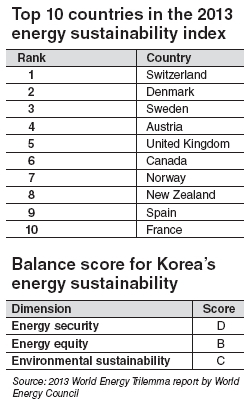 |
Source: 2013 World Energy Trilemma report by World Energy Council |
DAEGU ― Korea’s sustainability in the energy sector worsened this year from the previous one, affected by rising energy imports and falling energy affordability, according to the 2013 energy sustainability index, issued by the World Energy Council on Tuesday in its triennial World Energy Congress in Daegu.
The 2013 Energy Sustainability Index, made by the council in partnership with Oliver Wyman, a global management consultancy, evaluated 129 countries in three areas of energy sustainability last year: energy security, energy equity, and environmental sustainability. The results of the index show the ability of a country to provide a stable, affordable and environmentally-sensitive energy system, the surveyor said.
The index also offered a score for each area for the first time to show trade-offs between the different dimensions.
Switzerland was the best performer, receiving an A score in all three areas. Denmark and Sweden followed.
In Asia, Japan was the best performer in energy sustainability, in 16th place. Despite the continued suspension of its nuclear power plants after the 2011 Fukushima accident, Japan, a natural resource-poor country, scored A in energy security.
In contrast with Japan, Korea performed poor in the 2013 index, ranking 64th, and receiving the poorest score in energy security. It received a D in energy security, B in energy equity and C in environmental sustainability.
“Korea drops 10 places in the Index this year (from a year ago), affected by deteriorations in energy security and energy equity. It continues to be heavily reliant on fuel imports and its energy import to export ratio worsens this year. Energy equity performance also dropped this year from a year ago due to rising gasoline prices and a considerable drop in the perceived quality of electricity,” the report said.
“As a counter measure, Korea has invested in overseas resource development, but this brings new challenges such as low production capacity, lack of human resources, technical skills and so on,” the report added.
WEC suggested, “Korean policymakers need to continue focusing on the enhancement of overseas energy development, the development of renewable energy, and the expansion of the nuclear power sector considering safety issues, waste disposal, and increasing public acceptance by providing objective information and being transparent.”
By Seo Jee-yeon (
jyseo@heraldcorp.com)








